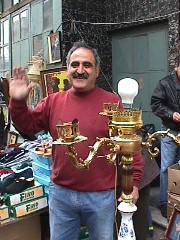 The Monastiraki flea market is the
place to be on Sunday when it
seems every Athenian is here
either buying or selling. You have
to get here early because after
about 11am the crowd becomes
impossible and if you want to take
a break there are few tables
available at the many cafes and
restaurants in the area. You can
wander around aimlessly or you can
find someone who knows the flea
market who can show you around if
you are intent on buying something
in particular.
The Monastiraki flea market is the
place to be on Sunday when it
seems every Athenian is here
either buying or selling. You have
to get here early because after
about 11am the crowd becomes
impossible and if you want to take
a break there are few tables
available at the many cafes and
restaurants in the area. You can
wander around aimlessly or you can
find someone who knows the flea
market who can show you around if
you are intent on buying something
in particular.
Much of the flea market is not
really a flea market. It is a
collection of small shops of which
most of them are tourist shops
with the same stuff you will find
on Adrianou street in the Plaka.
These are open normal shop hours
and you can come here anytime. But
weekends and Sunday in particular
is when it is like a third-world
flea market with people selling
anything from antiques to what you
might call useless junk and it
goes on forever, beyond
Monastiraki and into Thission and
Psiri. |
Getting to the flea market is
easy. If you are coming from
Syntagma you will be walking down
Metropolitan street, past the
Cathedral and the square of shiny
marble. There is a small Byzantine
church in the shadow of the
cathedral that you should take a
look at called Agios Eleftherios.Nearly every stone of this little church was taken from an ancient building
or older church including the stone from Galilee
where Jesus changed water into wine. The church
used to be called Panagia Gorgoepikofos which
means the Virgin Who Grants Requests Quickly
and inside is the Icon which they say performs
miracles. There are some cafes in the square
and this is where Pondrossou
street begins. This section of
Pondrossou is the high end section
of Monastiraki.
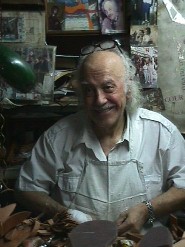 If you are coming
from the Plaka, near the end of
Adrianou street you will come to a
small square, every inch of which
has been taken over by fancy
tourist restaurants and cafes.
Hurry through it until you come
face to face with Hadrian's wall.
You can't miss it. Turn right and
then take a left down tiny
Pondroussou Street. (If you need to
ask directions remember Bonanza:
The Ponderosa). You are now in the
tourist infested heart of the
so-called Monastiraki Flea-Market.
But Keep walking to where
Pondrossou becomes narrow and the
shops get a little smaller. Stop
at the shop of Stavros Melissonos,
known among sandal-makers
as 'The
Poet'
(and among poets as 'the
sandal-maker'). If you are going
to buy sandals, and indeed you
should, this is the place. I always
ask him to put extra nails in the straps and
I also get the rubber soles since the leather
ones can be slippery on rocks. Just ask him
to put soles on. I also
encourage you to buy an
autographed copy of his book, The
Rubaiyat. The Beatles all got
their sandals from Stavros and his
poetry is taught in Universities
in the UK.
If you are coming
from the Plaka, near the end of
Adrianou street you will come to a
small square, every inch of which
has been taken over by fancy
tourist restaurants and cafes.
Hurry through it until you come
face to face with Hadrian's wall.
You can't miss it. Turn right and
then take a left down tiny
Pondroussou Street. (If you need to
ask directions remember Bonanza:
The Ponderosa). You are now in the
tourist infested heart of the
so-called Monastiraki Flea-Market.
But Keep walking to where
Pondrossou becomes narrow and the
shops get a little smaller. Stop
at the shop of Stavros Melissonos,
known among sandal-makers
as 'The
Poet'
(and among poets as 'the
sandal-maker'). If you are going
to buy sandals, and indeed you
should, this is the place. I always
ask him to put extra nails in the straps and
I also get the rubber soles since the leather
ones can be slippery on rocks. Just ask him
to put soles on. I also
encourage you to buy an
autographed copy of his book, The
Rubaiyat. The Beatles all got
their sandals from Stavros and his
poetry is taught in Universities
in the UK.
If you are coming down Athinas
from the direction of Omonia
then if you keep the Acropolis
in sight you will come right
to the flea
market. The train station is on
your right and Pondroussou street will
be on your left just past the souvlaki shops
and cafes. |
 Most of the action is further down
behind the metro station. Walk
down Efestou street to the right
of the train station and take your
second right into Avisynia square.
If you are lucky, the cafe will be
open. Tables and chairs will begin
to fill the square as the
merchants pack up their remaining
merchandise. More then
occasionally there is live music
and dancing in the streets in the
afternoon. If it's not Sunday it
is an area of tiny interesting
shops most of them selling
antiques. If you continue through
the square you will come to Ermou
and if you cross into Psiri there
are people selling there too. The
further you go the weirder it gets
and by the time you get down
towards Pireos street you have
very poor people buying and
selling from piles of rags and
little gypsy children running
barefoot.
Most of the action is further down
behind the metro station. Walk
down Efestou street to the right
of the train station and take your
second right into Avisynia square.
If you are lucky, the cafe will be
open. Tables and chairs will begin
to fill the square as the
merchants pack up their remaining
merchandise. More then
occasionally there is live music
and dancing in the streets in the
afternoon. If it's not Sunday it
is an area of tiny interesting
shops most of them selling
antiques. If you continue through
the square you will come to Ermou
and if you cross into Psiri there
are people selling there too. The
further you go the weirder it gets
and by the time you get down
towards Pireos street you have
very poor people buying and
selling from piles of rags and
little gypsy children running
barefoot. |
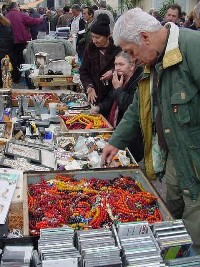 If you are looking for inexpensive
reading material, there are several
used book stores in this area selling
mostly paperback books. There are also
old coin, stamp and print shops,
mini-army-surplus stores where you can
buy actual machine guns left over from
the Nazi occupation. They look more
like garden tools than guns and you
probably won't be able to get them
through customs but if you are into
that kind of stuff, these stores are
worth looking through.
If you are looking for inexpensive
reading material, there are several
used book stores in this area selling
mostly paperback books. There are also
old coin, stamp and print shops,
mini-army-surplus stores where you can
buy actual machine guns left over from
the Nazi occupation. They look more
like garden tools than guns and you
probably won't be able to get them
through customs but if you are into
that kind of stuff, these stores are
worth looking through.
What to Buy? Anything that looks
interesting. As noted before, Sunday
is the best day to be here because you
never know what you will find. But on
regular shopping days the tiny shops
contain everything from worry beads,
furs, backgammon sets, toy evzone
soldiers, ancient Greek bottle openers
and cigarette lighters, Byzantine
Icons, paintings, statues, postcards,
high fashion such as T-shirts,
handbags with pictures of the
Parthenon and so on. (For jewelry
see Byzantino.) If you find a deal that is too good
to be true for ancient Greek, Roman
and Byzantine coins keep in mind that
there is a good possibility they are
fakes and that if they are real you
are not supposed to take them out of
the country. There is a huge market in used
phone cards, the same way Americans collect baseball
cards. If you buy a set you will probably be the
only person on your block who has them. There are
a couple old print shops that are worth checking
out. |
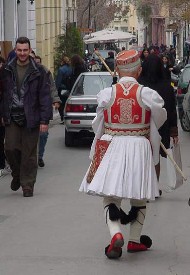 Overlooking Monastiraki square,
(which is still pretty much of a
construction site), and across the
street from the metro station is
the restored Turkish Mosque, now
the traditional ceramics museum.
Right next door are the large
columns and ruins of the Roman
Emperor Hadrian's Library and the
Roman agora. This is the street
where many of the street venders
are and if you go up and take a
right on Adrianou the road runs
parallel to the metro tracks and
the ancient Agora with the Stoa of
Attalos museum. Here you will find
several cafes, ouzeries a couple
restaurants and lots of people
selling stuff right on the street,
and plenty of interesting
people.
Overlooking Monastiraki square,
(which is still pretty much of a
construction site), and across the
street from the metro station is
the restored Turkish Mosque, now
the traditional ceramics museum.
Right next door are the large
columns and ruins of the Roman
Emperor Hadrian's Library and the
Roman agora. This is the street
where many of the street venders
are and if you go up and take a
right on Adrianou the road runs
parallel to the metro tracks and
the ancient Agora with the Stoa of
Attalos museum. Here you will find
several cafes, ouzeries a couple
restaurants and lots of people
selling stuff right on the street,
and plenty of interesting
people.
The entrance to the ancient Agora
is about half way down the block
on the left and you will see the
Thission, the almost completely
intact ancient temple that is
actually a temple to Hephaestus.
If you have not wandered around
here yet then you should. You can
cut through and go to the
Acropolis. There is an entrance
fee but there is a way of going up through
the Agora up Areos street that is free. |
 Nick Nikolau has been selling
antiques in Monastiraki for the
last twenty years. He is paid by
several museums to seek out
valuable pieces and claims he can
find anything you want and at good
prices. "Many of the pieces coming
into Greece from Eastern Europe
are priceless, but because the
Greeks have never seen them before
they don't know what they are
worth". Nick is among a community
of foreigners who sell imported
and handmade jewelry, beads and
other paraphernalia on the street
during weekends. It is a stressful
job because the police are
constantly harassing them and
making them take down their
displays, sometimes confiscating
them and making Nick and his
friends pay a hefty fine to get
them back. "It's like a game" says
Nick. "They come. They harass us
and make us take our stuff down.
They leave and we set up again. It
makes doing business very
difficult. But we can't get a
license to sell on the street and
we don't sell enough to open a
shop. The law does not allow us to
get together as a coop and open
our own shop either. Yet people
like our stuff and buy. It is
typical. They harass us and fine
us but they don't offer any
alternative. We are not criminals.
We are artists and merchants.
People need money to eat and some
of us have families to
support."
Nick Nikolau has been selling
antiques in Monastiraki for the
last twenty years. He is paid by
several museums to seek out
valuable pieces and claims he can
find anything you want and at good
prices. "Many of the pieces coming
into Greece from Eastern Europe
are priceless, but because the
Greeks have never seen them before
they don't know what they are
worth". Nick is among a community
of foreigners who sell imported
and handmade jewelry, beads and
other paraphernalia on the street
during weekends. It is a stressful
job because the police are
constantly harassing them and
making them take down their
displays, sometimes confiscating
them and making Nick and his
friends pay a hefty fine to get
them back. "It's like a game" says
Nick. "They come. They harass us
and make us take our stuff down.
They leave and we set up again. It
makes doing business very
difficult. But we can't get a
license to sell on the street and
we don't sell enough to open a
shop. The law does not allow us to
get together as a coop and open
our own shop either. Yet people
like our stuff and buy. It is
typical. They harass us and fine
us but they don't offer any
alternative. We are not criminals.
We are artists and merchants.
People need money to eat and some
of us have families to
support." |
 Nick's story is an interesting
one. Originally from Iowa, his
father was a Greek antique dealer
and his mother a teacher at the
American Community School in
Athens where Nick went to school.
After going to college in
Washington DC and working at the
National Zoo during the great
Panda Craze of the seventies, Nick
returned to Greece to live a life
that people write novels about.
"I've seen just about everything."
says Nick. Like many Athenians
Nick can escape the city to a
beautiful antique filled house on
the coast of the Peloponessos. Not
bad for a guy selling rings out of
a suitcase in the Monastiraki flea
market. Look for him. He's a nice
guy and a good source of
information and stories about
Monastiraki and Athens in general.
And if you are looking for
antiques talk to Nick. If you know
what you want, chances are he can
find it.
Nick's story is an interesting
one. Originally from Iowa, his
father was a Greek antique dealer
and his mother a teacher at the
American Community School in
Athens where Nick went to school.
After going to college in
Washington DC and working at the
National Zoo during the great
Panda Craze of the seventies, Nick
returned to Greece to live a life
that people write novels about.
"I've seen just about everything."
says Nick. Like many Athenians
Nick can escape the city to a
beautiful antique filled house on
the coast of the Peloponessos. Not
bad for a guy selling rings out of
a suitcase in the Monastiraki flea
market. Look for him. He's a nice
guy and a good source of
information and stories about
Monastiraki and Athens in general.
And if you are looking for
antiques talk to Nick. If you know
what you want, chances are he can
find it. |
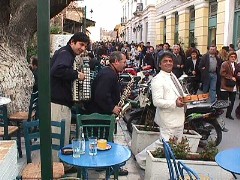 If you are like me and want to do
what I do come very early and go
to the Cafe Dioscouri at 39
Andrianou right in the flea market
around the corner from Nick and
his friends . If you are going to
the Sunday market come here early
because it fills up. They make
excellent coffee and it is a good
spot to watch the people go by,
but if you can't get a seat there
are plenty more cafes along the
fence which borders the ancient
Agora. Not everyone is a shopper.
Some of us are people watchers and
Sunday in Monastiraki gives you
plenty of opportunity to do just
that. Don't forget
the
best
souvlakis
are in Monastiraki at the end of
Metropolis street, either at the
restaurant owned by the famous
Sprios Bairactaris. (You will know
the place by the pictures all over
the walls of Spiros with Greek
politicians and celebrities.) or
at Thanasis, across the street,
the favorite place of all the taxi
drivers.
If you are like me and want to do
what I do come very early and go
to the Cafe Dioscouri at 39
Andrianou right in the flea market
around the corner from Nick and
his friends . If you are going to
the Sunday market come here early
because it fills up. They make
excellent coffee and it is a good
spot to watch the people go by,
but if you can't get a seat there
are plenty more cafes along the
fence which borders the ancient
Agora. Not everyone is a shopper.
Some of us are people watchers and
Sunday in Monastiraki gives you
plenty of opportunity to do just
that. Don't forget
the
best
souvlakis
are in Monastiraki at the end of
Metropolis street, either at the
restaurant owned by the famous
Sprios Bairactaris. (You will know
the place by the pictures all over
the walls of Spiros with Greek
politicians and celebrities.) or
at Thanasis, across the street,
the favorite place of all the taxi
drivers. |
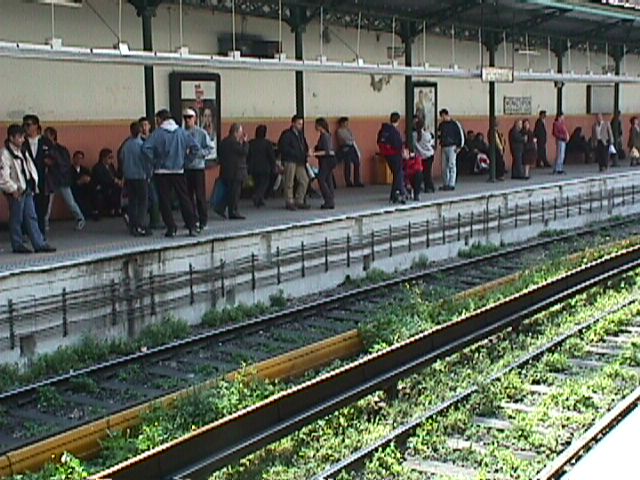 The Monastiraki train station is
your key to adventure so don't
forget where it is. This is where
you can take the train
to
Pireaus
to catch the ferry to the Greek
islands.
The Monastiraki train station is
your key to adventure so don't
forget where it is. This is where
you can take the train
to
Pireaus
to catch the ferry to the Greek
islands.
For instructions on how to do
this see my
Greek Island
Primer:
Step by Step Instructions for
visiting a Greek Island on
your
own
which includes the mysterious
art of buying tickets for the
Metro.
The new line which will
connect Monastiraki to
Syntagma is still being built
because they found so many
antiquities they had to move
it. It's a pain because that
means to get there now from
Syntagma you have to change
trains at Omonia. You may as
well walk.
If the idea of staying in a
hotel in this area is
appealing the
Attalos
is very convenient and pretty
nice and inexpensive. For
convenience and entertainment
it's not a bad area to be in
because at night you
have
Psiri
which is my favorite area for
nightlife. (This is where I
stay when I am in
Athens).
If you want to continue on for
more entertainment keep
walking into Psiri and find an
ouzerie or cafeneon to spend
the rest of the afternoon
eating, drinking and talking.
But only on Sunday. Otherwise
head back to the
Plaka
or the
Acropolis. |
|